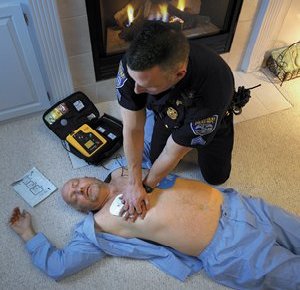
(Photo: photos.com)
A multidisciplinary team of researchers at the University of Michigan has found that when death induced by cardiac arrest is near, the brain bursts into a flurry of activity that may actually play a role in hastening the patient’s death.
It is generally thought that the sudden eruption of signals between the brain and heart may be part of the brain’s efforts to help save the cardiac arrest patient. But in a new study, the research team uncovered surprising evidence that this brain activity, in fact, disrupts heart function.
“Despite the loss of consciousness and absence of signs of life, internally the brain exhibits sustained, organized activity and increased communication with the heart, which one may guess is an effort to save the heart,” said neurologist and senior author Jimo Borjigin, associate professor of molecular and integrative physiology in a University press release.
The research team included investigators with a wide-ranging backgrounds, from engineering, neuroscience, physiology, cardiology, chemistry, to pharmacology. The team examined the biological processes that can lead a healthy heart to stop beating after being deprived of oxygen for a few minutes.
The researchers simultaneously examined the hearts and brains of lab rats who were in cardiac arrest after experimental asphyxiation.
Along with asphyxiation, medical conditions such as cardiac arrhythmias, ischemic stroke, traumatic brain injury, brain hemorrhage and epilepsy can also induce cardiac arrest.
While monitoring the brain and heart activity of rats in cardiac arrest, the researchers noticed an immediate release of a number of neurochemicals from the brain as well as the initiation of heightened brain-heart communication.

An EMS technician performs CPR on a cardiac arrest patient. Behind patient is an automated external defibrillator (AED) which is also used to help stop ventricular fibrillation (David Bruce Jr./Creative Commons)
Using a new device called the electrocardiomatrix, which was developed in Borjigin’s laboratory, researchers noticed that signals from the brain synchronized with the heart rhythm following a steep drop in the heart rate of the lab animals.
But by blocking the flow of the brain’s neurochemicals and communication with the heart, the researchers said that they were able to greatly delay ventricular fibrillation, the most serious cardiac rhythm disturbance.
The lower chambers of the heart simply quiver and are unable to pump any blood during ventricular fibrillation.
“The study suggests that a pharmacological blockade of the brain’s electrical connections to the heart during cardiac arrest may improve the chances of survival in cardiac arrest patients,” said Borjigin.
According to the American Heart Association, brain death and permanent death can begin in just 4-6 minutes after cardiac arrest. A cardiac victim’s chances of survival drop by 7-10 percent with each passing minute without CPR and defibrillation assistance. Few attempts at resuscitation succeed after 10 minutes, according to the American Heart Association.
The study by Borjigin and her team will be published in this week’s PNAS Early Edition.






















Comments are closed.